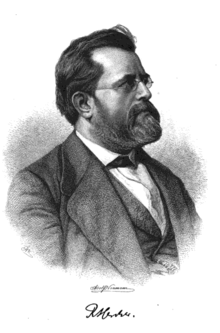Rudolf Hercher

Rudolf Hercher (
Life
Rudolf Hercher was born in
After his summer teaching position of 1846 was over, Hercher was offered a position as a Collaborator at the Grammar school in Rudolstadt in December of the same year, which he took up in 1847. After seven years of employment he became a schoolmaster in 1854. In the following years, Hercher repeatedly received the opportunity to go on long sabbaticals: He spent further months in
In Berlin, Hercher interacted with the leading ancient scholars, including Moriz Haupt, Immanuel Bekker, and August Meineke; with Theodor Mommsen and Adolf Kirchhoff he founded the journal Hermes: Zeitschrift für classische Philologie (Hermes: Journal of Classical Philology) in 1866, which continues to this day. The interaction with his colleagues was so important to Hercher, that he rejected three job offers from foreign universities. On 14 July 1873 he was enrolled as an ordinary member in the Prussian Academy of Sciences, on 19 December 1875 as a corresponding member in the St. Petersburg Academy of Sciences.
In his later years, Hercher came to suffer from
Works
Rudolf Hercher is especially known for his works on
Especially his edition of the erotic authors (Erotici Graeci, two volumes,
1872).As well as these and other monographs, Hercher wrote hundreds of shorter articles on textual criticism and exegesis. He especially discussed the Homeric Epics often. After his death, Carl Robert's archaeology and philology division published these papers under the title Homerische Aufsätze von Rudolf Hercher (Berlin 1881).
List of works
- On the Names of Rivers and Mountains
- Arriani Nicomediensis Scripta Minora (1854)
- Erotici Graeci, two volumes, (Leipzig 1858–1859)
- Aelian (1858)
- Astrampsychi oraculorum decades (Berlin 1863)
- Aineias Taktikos (Berlin 1870)
- Plutach's Moralia, only one volume appeared (Leipzig 1872)
- Epistolographi Graeci (Paris, 1873)
- Homerische Aufsätze (Berlin, 1881)
References
- ^ ISBN 978-90-5972-344-3.
- ISBN 978-1-349-01779-9.
